The BRC-20 fork caused controversy. What are the positions and possible impacts of all parties?
- WBOYWBOYWBOYWBOYWBOYWBOYWBOYWBOYWBOYWBOYWBOYWBOYWBforward
- 2024-01-24 11:57:25808browse
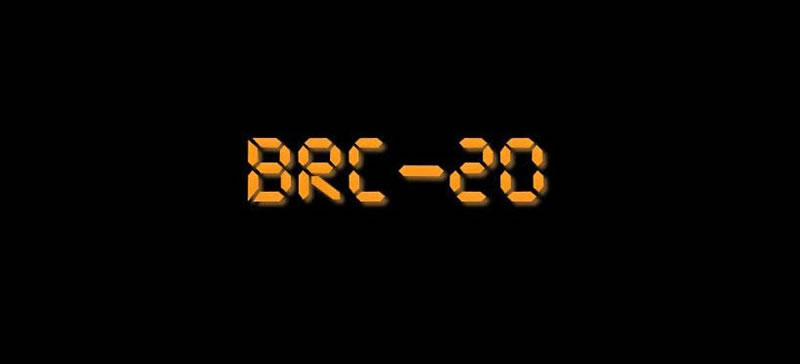
As 2024 is about to enter its third day, a tweet from domodata, the founder of BRC-20, has stirred up waves, and the BRC-20 fork dispute has officially come to the fork. .
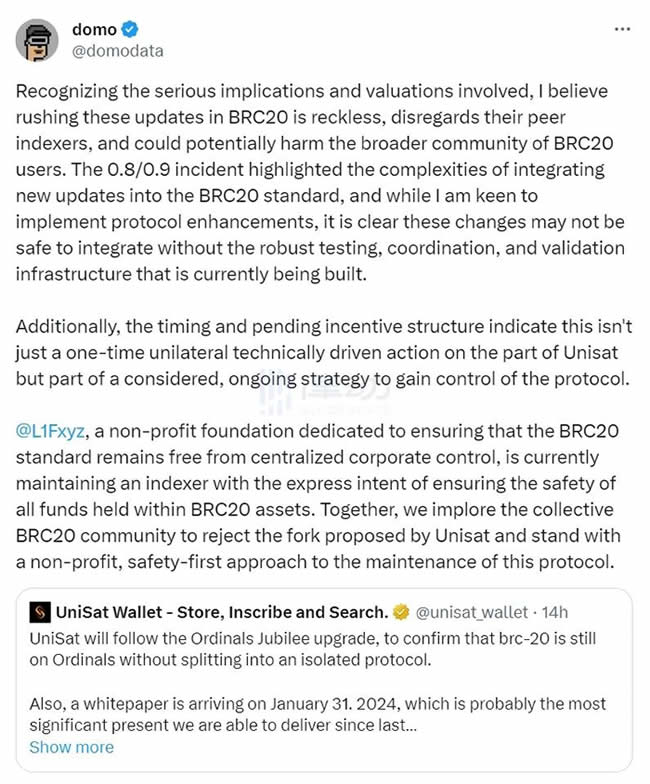
In this tweet, domo made serious accusations against UniSat. Domo claimed that UniSat's upgrade of the Ordinals protocol of the BRC-20 index to version v0.13.0 was a "fork" of BRC-20, a "unilateral" technical behavior by UniSat, and a fight for control of the protocol.
How to quickly understand this "fork" dispute? This "fork" debate is like we all hold the same asset (BRC-20 Token). Before, we had no problem depositing, withdrawing/trading in various places such as UniSat, MagicEden, OKX, etc. because they all use Same accounting system. Now, UniSat wants to upgrade the accounting system. If other places do not follow up the upgrade, the rules of the accounting system may be different, and the accounting results (the BRC-20 Token in everyone’s hands) may be different in different places. Different balances will appear, which can lead to confusion.
So why are there such differences? What is the attitude of each company that continues to build the BRC-20 agreement towards this disagreement? What are the potential impacts of disagreements?
Why are there such differences?
On November 9, 2023, with the output of the Bitcoin block with a height of 816,000, the BRC-20 index specification "freeze" proposal officially came into effect.
The "freeze" proposal of the BRC-20 index specification was proposed by domo, the founder of the BRC-20 protocol, on October 26. Domo named the proposal "Freeze" because the purpose of the proposal is to standardize the index of BRC-20 and keep it at version v0.9.0 to maintain the stability of the index.
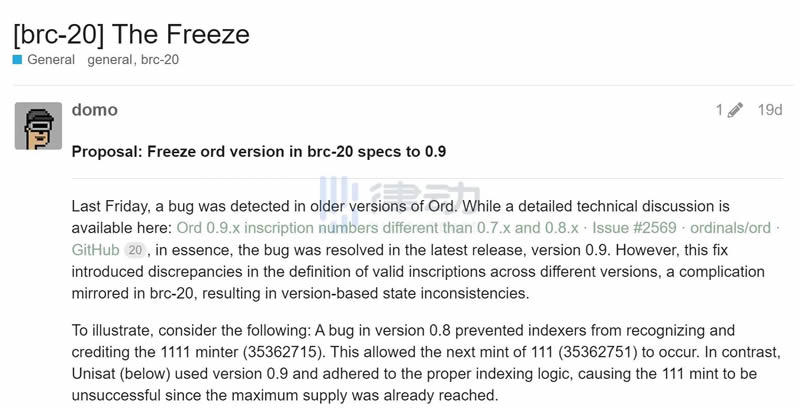
In October 2023, it was discovered that the inscriptions #35321413 and #35329860 could be indexed by the v 0.9.0 version of the Ordinals protocol, but not by v 0.7.0 and v 0.8.0 version index. Since different markets use different versions of the Ordinals protocol, some inscriptions cannot be indexed correctly in some markets, causing a de facto inscription number shift.
For BRC-20, this problem is even greater. v A bug in the Ordinals protocol in version 0.8.0 makes double-spending between minting beyond the maximum supply and Ordinals protocol version differences in different markets a huge risk. This is why Magic Eden briefly suspended the trading of BRC-20 in November 2023 - Magic Eden did not have any fault, but the version it used happened to be severely affected. Suspending trading in a timely manner is responsible for users.
BRC-20 is a protocol that "parasitizes" on the Ordinals protocol. Whether its index should be upgraded along with the Ordinals protocol is a dilemma at this stage. On the one hand, the Ordinals protocol is still rapidly updating and iterating, and more and more new features are being added to the protocol, especially the "Jubilee" upgrade that will be activated at block height 824544. The original method of generating curse inscriptions The method will be fixed, which means that the curse inscriptions that will be given negative numbers in v 0.9.0 version of the Ordinals protocol will be given positive numbers in v 0.13.0 version. The version difference of the Ordinals protocol will make subsequent The numbering of the new inscriptions is very different. In addition, new features such as CBRC-20, which uses a new version of the Ordinals protocol to bring performance optimization to the modified version of the BRC-20 protocol, also pose certain challenges to the development of BRC-20.
On the other hand, as an asset protocol that has produced a large number of assets with a huge market value, maintaining stability during the development process of BRC-20 has naturally become the top priority. If the pursuit of new features to optimize and expand BRC-20 results in a loss of user assets, it will undoubtedly cause huge harm to the BRC-20 ecosystem.
On this issue, there are differences among the companies that have a say in the BRC-20 agreement. This is the reason why BRC-20 is facing this "fork" dispute. The so-called "fork" debate is whether to upgrade the Ordinals version running on the BRC-20 index from version v 0.9.0.
The attitudes of all parties towards "bifurcation"
Disapproval: domo, the attitude of Layer 1 Foundation led by Best in Slot
domo has been mentioned at the beginning of this article . Best in Slot even tweeted yesterday that a "serious vulnerability" was found in the Ordinals protocol v 0.13.1 that would affect the correctness of the BRC-20 balance, and strongly called on the BRC-20 index to keep the running version at v 0.9.0 version to maintain protocol stability. Best in Slot also stated in a tweet that there are likely to be other bugs affecting the BRC-20 protocol in version v 0.13.1. "Stability" is the first priority of BRC-20. The already huge BRC-20 protocol cannot Withstand ongoing, untested upgrades.
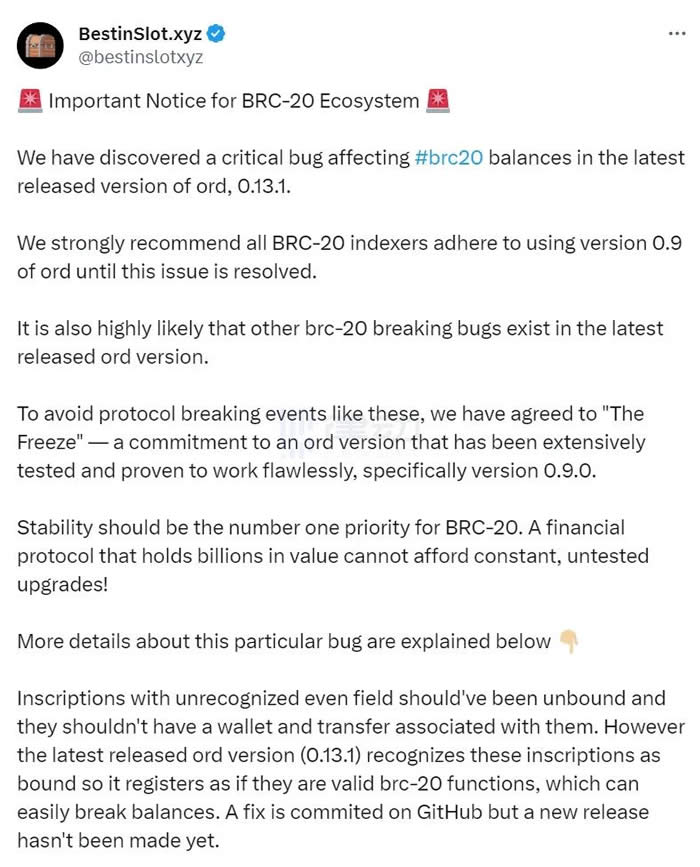
Like: UniSat
UniSat has always been aiming to quickly promote BRC-20 related development. From the functional development of BRC-20 Swap, to this direct statement that it will promote the upgrade of the Ordinals protocol version run by the BRC-20 index. After domo’s tweet was issued, UniSat also tweeted in response, stating that it would currently suspend the remaining development tasks and make every effort to ensure that the BRC-20 upgrade proceeds as scheduled. At the same time, UniSat also pointed out that they will do their best to ensure that BRC-20 does not "split".
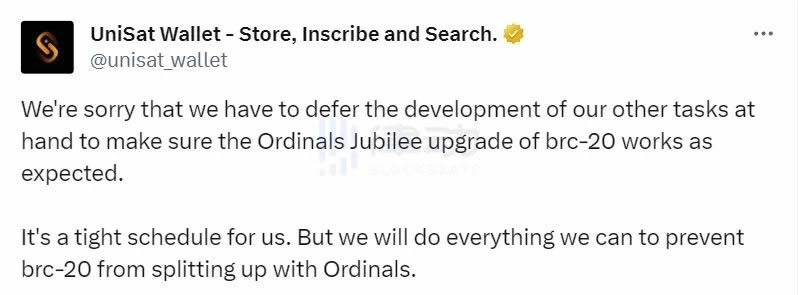
Additionally, there is news that Magic Eden is in favor of the BRC-20 upgrade.
Neutral: TRAC
TRAC founder Benny maintains a neutral stance on disagreements. He said that it is definitely wrong that the Ordinals protocol version running on the BRC-20 index has been kept at version v 0.9.0, but weeks or even months of testing are needed before upgrading to ensure that switching to the new version will work properly.

Potential Impact
UniSat uses "split" to describe this disagreement, rather than "bifurcation". UniSat pointed out that "fork" is a "parting of ways" in the physical sense caused by differences in consensus. For example, BCH and BTC actually form two chains, each developing according to its own consensus without affecting the other. The possible result of the BRC-20 upgrade disagreement is that a BRC-20 protocol runs two sets of indexes with different rules on the same chain (Bitcoin main network), and they will still affect each other.
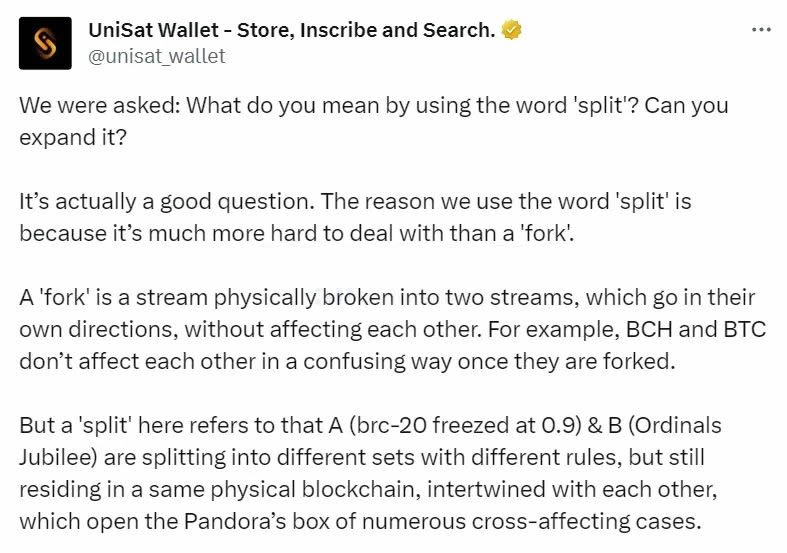
#The "split" dispute over BRC-20 has cast another shadow over the inscription market, which is currently cooling down. But you don’t have to worry too much, because no party really wants to harm BRC-20. They just have different understandings on how to better develop BRC-20. This is actually a good thing and also BRC-20. tests that must be endured in the development process. I believe that all parties will properly discuss this issue, come up with a result that everyone agrees with, and develop a good dialogue mechanism from this incident. After the storm, the future of BRC-20 will surely be brighter.
The above is the detailed content of The BRC-20 fork caused controversy. What are the positions and possible impacts of all parties?. For more information, please follow other related articles on the PHP Chinese website!

